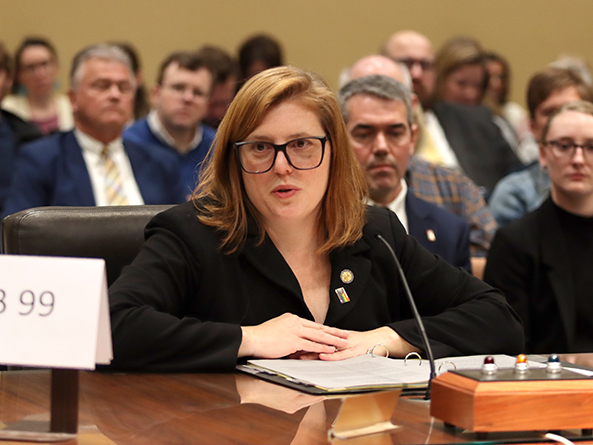State would reimburse schools for meal costs
The Education Committee heard testimony Feb. 13 on a bill intended to ensure that Nebraska public schools serve free meals to all students.

LB99, sponsored by Omaha Sen. Machaela Cavanaugh, would require public schools participating in the federal school breakfast program or the national school lunch program to offer meals at no cost to all students and submit information on the number of meals served to the state Department of Education.
The bill also would require eligible school districts to opt in to a federal reimbursement program, called the community eligibility provision, that allows schools with high poverty rates to serve free breakfast and lunch to their students without collecting financial information from households.
Cavanaugh said childhood hunger and food insecurity are linked to poor academic performance, poor health and higher rates of depression, suicide and incarceration.
“We can all agree that Nebraska taxpayer dollars are better spent on programs that keep kids healthy and learning,” she said.
The department would reimburse school districts for free meal costs that are not reimbursed by the federal government. Districts that have not adopted the CEP would be reimbursed 30 cents for each reduced-price breakfast and 40 cents for each reduced-price lunch.
The state Department of Education estimates that the reimbursements would cost the state approximately $55 million per year for each of the next two fiscal years.
Cavanaugh brought an amendment to the hearing that she said would allow the department to waive the free breakfast requirement for schools lacking the necessary facilities to provide breakfast.
Julia Keown testified in support of LB99 on behalf of the Nebraska Nurses Association. She said programs that provide free meals to students at schools are strongly associated with increased test scores and decreased disciplinary actions for students at school.
They also help reduce “toxic stress” during childhood that is tied to poor health outcomes, Keown said.
Eric Savaiano of Nebraska Appleseed also testified in support, saying California, Colorado and Maine have adopted similar legislation. Three additional states have implemented a free school meal program for one year, and another has implemented it for two years, he said.
Also in support was Jane Seu of the ACLU of Nebraska. She said school meal debt often punishes low-income students and families, particularly students and families of color.
“No student in our public schools should be punished or shamed or lack focus in school because of their low-income status,” Seu said, “nor should a child have to sit through school for eight hours on a hungry stomach.”
No one testified in opposition to LB99 and the committee took no immediate action on it.


